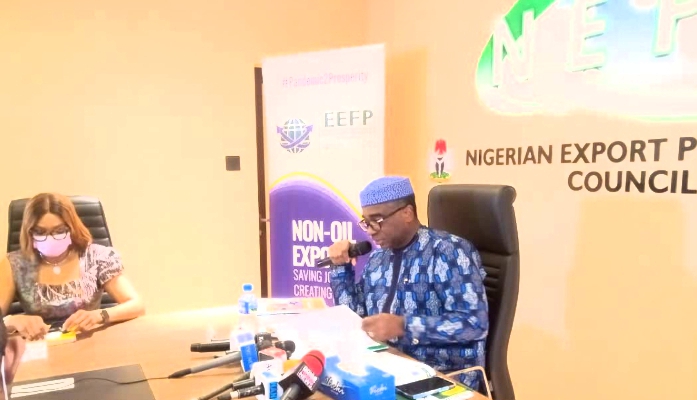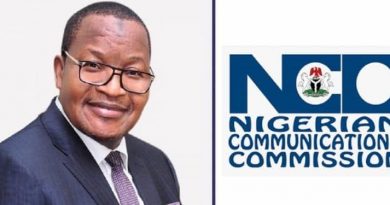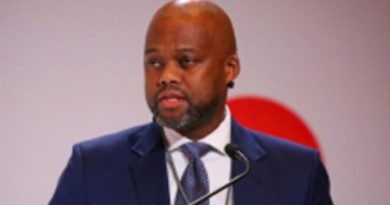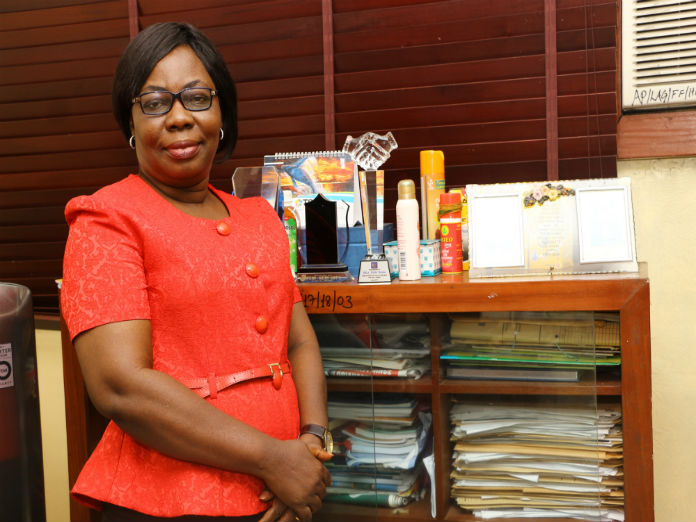HOPE FOR NIGERIA YOUTH: Oil Sector is Not Our Only Means of Survival- NEPC
Maryam Aminu
The Nigeria Export Promotion Council (NEPC), and the National Information Technology Development Agency (NITDA), through the Export Expansion Facility Programme, EEFP are providing about 150 million naira grant support to innovation hubs across three geo-political zones in Nigeria.
The Executive Director, Nigeria Export Promotion Council, Dr Segun Awolowo made the above statement while briefing journalists on his last day in office, the journey so far in respect to 3 innovation hubs collaboration with NITDA on Friday 26 November,2021 in Abuja.
The partnership is also providing another about 300 million naira in grants to support start-ups that are exporting and have the potential to export services in the EntertainmentTech, FinTech, EduTech and LogisticsTech sectors, he said.
“The partnership is also working to provide support to the drive advocacy to ensure that the Nigerian Start-up Bill is passed by the end of the year.”
Awolowo is a Zero Oil Advocate of Nigeria, an initiative he launched as an economic blueprint for Nigeria to boost non-oil exports, among several others.
Recall that the NEPC in recognition of the huge opportunity for Nigeria to take advantage of the export of services $4.7 trillion a year market, set up a working group under the Export Expansion facility Programme, EEFP in partnership with the National Information Technology Development Agency (NITDA), to design and implement initiatives that will grow the Nigeria services export sector.
Some of the achievements of the initiative include the Outsource Nigeria Initiative, financial interventions for six start-ups, support to three innovation hubs, setting up of skills acceleration centers and advocacy support for the Nigerian Start-up Bill.
The Outsource Nigeria initiative aims to train at least 300 youths every 6 months across three geopolitical zones (North West, South East and South West) to be well equipped to export high in-demand digital skills as advised by WEF, thereby taking advantage of the Services Export market and making Nigeria a premium destination for Business Process Outsourcing (BPO). Every cohort of trained youths will potentially earn $9 million per year for the country.
This is expected to increase the global competitiveness of our labour force, reduce youth unemployment and earn more foreign exchange for the country.
According to him, the Outsource Nigeria initiative is being implemented through a strategicpartnership between the government, academia and industry. Its pilot is a partnership with the Central Bank of Nigeria (CBN) Centres of Excellence in three institutions – the University of Nigeria, Ahmadu Bello University and the University of Ibadan with funding support from the CBN Creative Industry Financing Initiative.
‘‘Furthermore, the Digital Economy Infrastructure that is being deployed for the pilot will make these centres and universities first class technology development zones.’’
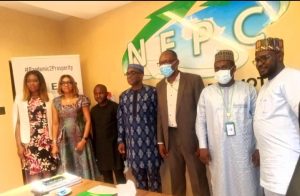
And to consolidate on the achievements of the partnership, the partners has decided to offer grant support to the upcoming Nigerian Start-Ups with innovative ideas that could generate goods and services that could earn the country foreign exchange and also be exported to Diaspora market.
In addition to the grants, the partnership plans to provide the three Centres of Excellence with 1 Gbps Direct Internet Access (DIA) for free for ten years, while the entirety of the respective campuses will have 9Gbps DIA at a cost of one-seventh of a dollar per day.
And to ensure sustainability the digital economy infrastructure, Awolowo said partners have been mandated as part of their project charter, to use part of the revenue generated from the pilot universities to scale the same infrastructure to Nigeria’s over 500 universities,’’ he said.
On sustainability, he stated that the innovation hub at the University of Ibadan has been mandated as part of its project charter to constantly review the curriculum of two undergraduate courses in their custody, GES 301 and ETR 301, to reflect the constant opportunities in non-oil exports, innovation, technology development and the future of work.
This, he said will drive an organic sensitization of about 7,000 youths every session in non- oil exports opportunities.
Speaking further, Awolowo informed that the World Economic Forum, WEF has agreed to set up a Country Accelerator in Nigeria, making Nigeria the 2nd country in Africa and the 14th country in the world where this has been setup.
With the setting up of the centre, he said that Nigeria will be included in the WEF Future of Jobs Report due to be published in 2022.
‘’This we believe will help in mapping the skills available in Nigeria and compare with similar data collected from other countries, thereby giving a better sense of where Nigeria has an advantage in exporting services. We are confident that this will be a good stepping-stone to build a modern labour market information system in the country as part of the Closing the Skills Gap Accelerator. ‘‘The team at WEF were also particular about providing support for the Nigerian Startup Bill and providing their platform for Nigeria to leverage their EduTech partners, to scale up skills acquisition from hundred to tens of thousands of youths through the digital economy infrastructure to be deployed in the universities earlier mentioned,’’ he concluded
In his remarks, the representative of the Director General of NITDA, Kashifu Inuwa Abdullahi said NITDA is proud to associate with the NEPC in empowering Nigerian innovation Start-Ups with digital skills that would enhance their outputs and showcase them to the world.
He stated that the partnership between NEPC and NITDA is worthy of emulation and as such urged other agencies to emulate this wonderful collaboration as it will build the necessary capacity and competency for acceleration of digital skills to improve employment.
Kashifu urged beneficiaries to utilize the grant for the purpose it was meant for.

